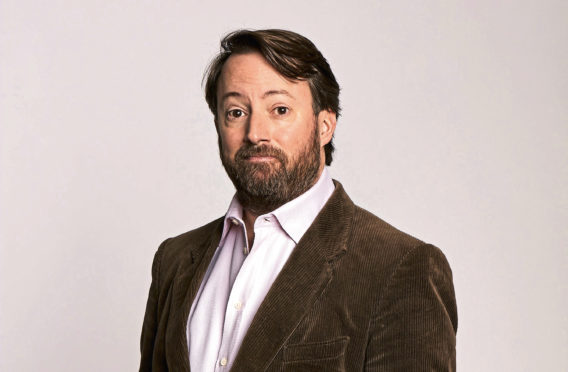
As the posh team captain on TV panel show Would I Lie To You?, David Mitchell’s only worry is getting away with telling a few porkies to quickfire opponent Lee Mack.
But away from the spotlight, Mitchell admits that having a family of his own – he’s married to TV presenter, writer and professional poker player Victoria Coren Mitchell, with whom he has a four-year-old daughter, Barbara – has increased his fears for the future.
“I’m probably more fearful in middle age,” the 45-year-old comedian confesses.
“I now have a wife and a child, so in terms of society breaking down and the world collapsing, it’s more frightening than when there’s just you.”
His priorities have changed hugely since his daughter was born, he admits.
“When it was just me on my own, things being probably fine was just good enough. But probably fine isn’t good enough when I’m thinking about my child.
“Suddenly you need things to be definitely fine – and things are never definitely fine, and that’s frightening.
“Your focus completely changes. You stay in a lot more and sleep a lot less. But I still do the same job and I love my job in the same way and Victoria similarly, but there’s always something in your mind which is a different priority, a home you have to keep safe and supplied, and make sure our daughter is happy and seeing us a lot.”
His latest book, Dishonesty Is The Second-Best Policy, is a collection of his columns written for the Observer between 2015 and 2019, tackling a plethora of subjects – from politics, the Olympics and terrorism, to rude street names, exercise and the commercialisation of Christmas.
Of course, Trump in the White House and the Brexit shambles have given him plenty of material.
“I wanted to reflect on Brexit and Trump and the way discourse is changing and the end of truth. But I also wanted to make sure there was stuff about chocolate bars and adverts and films, because I am a comedian and it should be a funny take on things.”
There are plenty of comedic rants and clearly an underlying anger at many of the subjects he tackles. How difficult is it to be amusing while suppressing such ire?
“I find it’s easier to be funnier when I’ve got something I want to say,” says Mitchell.
“I find it hard to make neutral jokes. Jokes are what come when you are trying to argue a line, when you are trying to say that something is ridiculous or daft, fairly or unfairly criticised.”
But his anger hasn’t intensified with the onset of middle age, he stresses.
“I think I’ve always been quite irritable about politics.
“From the first days when I was doing panel shows, I got myself going through an energised irritability.”
Born in Salisbury, Wiltshire, Mitchell is the son of a couple who ran a West Country pub in the ’70s, and then moved to Oxford where they became lecturers in hotel management.
He began to tread the boards at New College prep school in Oxford, but never thought he had a real talent for comedy.
He failed to get into Oxford University but was offered a place at Cambridge to study history, becoming president of Cambridge Footlights, where he met Robert Webb.
The pair formed a double act which lasted more than 20 years, and he went on to win Baftas for Peep Show and That Mitchell And Webb Look, became the regular team captain on WILTY? and recently starred as William Shakespeare in Ben Elton’s BBC2 sitcom, Upstart Crow.
His path to love was slightly more rocky. Mitchell met Coren in 2007 at a film premiere party and they went out on a few dates, before she emailed him to say that she didn’t think the timing was right.
She went on to find another boyfriend. Mitchell went out and got drunk a lot. He was smitten and didn’t want to date anyone else.
“I didn’t tell my closest friends or my parents of the enormous sadness that overshadowed my life,” he wrote in his 2012 memoir, Back Story.
“I was ashamed and I knew what they’d say, ‘Stop indulging yourself in these hopeless feelings. Snap out of it. She doesn’t want to go out with you – she said so.’”
He waited three years for her to ditch her boyfriend before making his move – and they’ve now been happily married for seven years.
“She’s clever, funny, beautiful,” he has said. “I think she’s amazing.”
Today, it sounds like she was well worth the wait.
“We laugh a lot at home. I love making my wife and my daughter laugh and they make me laugh a lot.
“Victoria is as obsessed with humour as I am and that’s how we’re bringing up our child.
“She may react strongly against it and get massively into Ibsen, I don’t know.”
Yet he hadn’t always yearned for a family of his own. “I hadn’t seen myself as someone who would necessarily get married or have a family,” he says.
“It was very much meeting Victoria which made me think, ‘Oh, now if I don’t spend my life with her it would be awful’, and then having a child came from that.”
Dishonesty Is The Second-Best Policy by David Mitchell is published by Guardian Faber, priced £20. Available now.

Enjoy the convenience of having The Sunday Post delivered as a digital ePaper straight to your smartphone, tablet or computer.
Subscribe for only £5.49 a month and enjoy all the benefits of the printed paper as a digital replica.
Subscribe